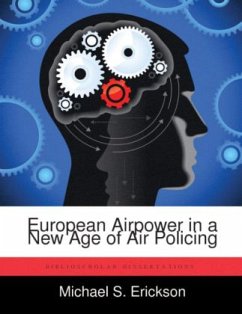When the North Atlantic Treaty Organization (NATO) was created over 50 years ago, its mission was to be a ready deterrent to the Warsaw Pact nations, capable of thwarting the Soviet Union should they bring their massive armies into Western Europe in a force-on-force war. To meet the Cold War threat, Europe's air forces did not have to be particularly deployable, agile or interoperable. However, the dissolution of the Soviet Union in the early 1990s changed the security landscape to a more unpredictable, global threat. The missions Europe's air forces are now required to perform have tenets similar to air policing, which the Royal Air Force used in British protectorates during the 1920s. Specifically, European air forces must be capable of strategic airlift, ISR, precision engagement, tactical mobility and persistent presence. The conflicts in the Balkans and Afghanistan demonstrated that European air forces were not prepared to execute air policing operations without significant US airpower contributions. European nations have recently embraced transformation for their air forces, but serious gaps in strategic airlift and accessible ISR still exist. European nations must continue to maximize common budgets and cooperative funding for needed capabilities. Until Europe is capable of leading air policing operations, the United States must be willing to fill capability gaps where necessary. In addition, less stringent restrictions on US technology transfer will decrease the time Europe needs to fill those gaps. A more capable air policing force in Europe is in the best interest of all parties in the transatlantic alliance.
Hinweis: Dieser Artikel kann nur an eine deutsche Lieferadresse ausgeliefert werden.
Hinweis: Dieser Artikel kann nur an eine deutsche Lieferadresse ausgeliefert werden.








